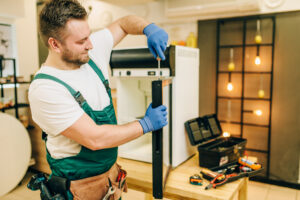Image by pvproductions on Freepik
A dishwasher is a modern convenience that saves time and energy in the kitchen. It’s an essential appliance for many households, especially for those with busy lifestyles.
However, if your dishwasher isn’t cleaning your dishes correctly, it can be a major inconvenience, and you may be left wondering what’s wrong with it.
Fortunately, there are some common causes of a dishwasher not cleaning correctly that you can troubleshoot and fix without calling a professional.
In this post, we’ll cover the most likely culprits for a dishwasher not cleaning correctly, such as clogged spray arms and filters, hard water buildup, incorrect loading of dishes, and old or worn-out parts.
We’ll also provide practical steps you can take to troubleshoot and fix these issues, along with additional tips to improve your dishwasher’s performance and keep your dishes spotless every time.
Common Causes of Dishwasher Not Cleaning Properly
A dishwasher that’s not cleaning dishes correctly can be frustrating and time-consuming. However, it’s usually caused by one or more of the following issues:
- Clogged Spray Arms and Filters – Over time, food debris and mineral buildup can clog the spray arms and filters, reducing their ability to clean dishes effectively. This can lead to food particles remaining on your dishes after a wash cycle.
- Hard Water Buildup – Hard water contains high levels of minerals, such as calcium and magnesium, that can leave behind mineral buildup on dishes and the dishwasher’s interior. Over time, this buildup can reduce the effectiveness of your dishwasher and cause spots on your dishes.
- Incorrect Loading of Dishes – Proper loading of dishes is critical to the dishwasher’s ability to clean dishes effectively. Overloading the dishwasher, blocking the spray arms, or not loading dishes properly can reduce the water flow and detergent distribution, leading to poor cleaning performance.
- Old or Worn-Out Parts – Dishwashers have various parts that can wear out or break over time, such as the spray arms, pumps, or motors. These parts can affect the dishwasher’s ability to clean dishes properly and may require replacement.
By identifying the underlying causes of your dishwasher’s poor performance, you can troubleshoot and fix the issues to get your dishwasher back in top condition.
Troubleshooting Steps to Fix Dishwasher
Once you’ve identified the potential causes of your dishwasher’s poor performance, you can take the following troubleshooting steps to fix the issue:
- Check and Clean Spray Arms and Filters – Remove the spray arms and filters from the dishwasher and check them for clogs or damage. Clean the spray arms and filters with a soft brush, warm water, and soap. If the spray arms or filters are damaged, replace them.
- Descale Dishwasher with Vinegar or Commercial Cleaner – Hard water buildup can be removed by running a descaling cycle with vinegar or a commercial dishwasher cleaner. Pour a cup of vinegar or cleaner into the bottom of the dishwasher and run a hot water cycle. Repeat as necessary until the mineral buildup is removed.
- Load Dishes Properly – Ensure that dishes are loaded correctly, with no obstruction to the spray arms. Leave enough space between the dishes to allow water and detergent to circulate properly.
- Replace Old or Worn-Out Parts – If you’ve checked the spray arms, filters, and other dishwasher components and found that they’re damaged or worn out, it’s time to replace them. Consult the dishwasher’s manual or a professional technician for guidance.
By taking these troubleshooting steps, you can often fix your dishwasher’s performance issues and ensure that your dishes come out clean every time. Remember to also follow additional tips to improve your dishwasher’s performance and prevent future issues.
Additional Tips to Improve Dishwasher Performance
In addition to the troubleshooting steps mentioned in Section III, here are some additional tips to help improve your dishwasher’s performance and keep your dishes clean:
- Use Hot Water and High-Quality Detergent – Hot water helps to dissolve detergent and food particles more effectively. Use high-quality detergent and follow the manufacturer’s instructions for best results.
- Scrape Food Scraps off Dishes Before Loading – Scrape food scraps and debris off dishes before loading them into the dishwasher. This helps to prevent clogs in the spray arms and filters and ensures that the dishwasher can clean the dishes thoroughly.
- Run Hot Water in Sink Before Starting Dishwasher Cycle – Run hot water in the sink for a few seconds before starting the dishwasher cycle. This helps to ensure that the dishwasher fills with hot water, which is essential for optimal cleaning performance.
- Regular Maintenance and Cleaning – Regularly clean the dishwasher’s interior, spray arms, and filters to prevent clogs and buildup. Refer to the dishwasher’s manual for specific cleaning instructions and recommended maintenance schedules.
By following these additional tips, you can improve your dishwasher’s performance and keep your dishes clean and spotless every time.
In conclusion, a dishwasher is an essential kitchen appliance that makes cleaning up after meals easier and faster. However, a dishwasher that’s not cleaning dishes properly can be frustrating and time-consuming. By identifying the common causes of poor dishwasher performance and taking the troubleshooting steps discussed in this post, you can fix most issues and ensure that your dishes come out clean every time.
Remember to also follow the additional tips to improve your dishwasher’s performance and prevent future issues. With regular maintenance and proper loading of dishes, you can keep your dishwasher running smoothly and extend its lifespan.
If you’ve tried these troubleshooting steps and your dishwasher still isn’t cleaning your dishes properly, it may be time to call a professional technician for further assistance. By taking care of your dishwasher and maintaining it regularly, you can ensure that it serves you well for years to come.



